An Empty Coast Read online
About An Empty Coast
A BODY. A COVER-UP. A BURIED SECRET.
Sonja Kurtz – former soldier, supposedly retired mercenary – is in Vietnam carrying out a personal revenge mission when her daughter sends a call for help.
Emma, a student archaeologist on a dig at the edge of Namibia’s Etosha National Park, has discovered a body dating back to the country’s liberation war of the 1980s.
The remains of the airman, identified as Hudson Brand, are a key piece of a puzzle that will reveal the location of a modern-day buried treasure – a find people will kill for.
Sonja returns to the country of her birth to find Emma, who since her call has gone missing.
Former CIA agent Hudson Brand is very much alive and is also drawn back to Namibia to finally solve a decades-old mystery whose clues are entombed in an empty corner of the desert.
Contents
Cover
About An Empty Coast
Dedication
PART 1 – LIFE
Prologue
Chapter One
Chapter Two
Chapter Three
Chapter Four
Chapter Five
Chapter Six
Chapter Seven
Chapter Eight
Chapter Nine
Chapter Ten
Chapter Eleven
Chapter Twelve
PART 2 – DEATH
Prologue
Chapter Thirteen
Chapter Fourteen
Chapter Fifteen
Chapter Sixteen
Chapter Seventeen
Chapter Eighteen
Chapter Nineteen
Chapter Twenty
PART 3 – REVENGE
Prologue
Chapter Twenty-one
Chapter Twenty-two
Chapter Twenty-three
Chapter Twenty-four
Chapter Twenty-five
Chapter Twenty-six
Chapter Twenty-seven
Chapter Twenty-eight
Chapter Twenty-nine
Chapter Thirty
Chapter Thirty-one
Chapter Thirty-two
Chapter Thirty-three
Chapter Thirty-four
Chapter Thirty-five
Chapter Thirty-six
Epilogue
Historical Note and Acknowledgements
About Tony Park
Also by Tony Park
Copyright page
For Nicola
PART 1
LIFE
Skeleton Coast National Park, South West Africa, 1987
In all probability, the rest of her kind had been exterminated. Her sisters were all dead and she hadn’t seen the father of her offspring for weeks.
Once they had ruled from the icy waters of the Atlantic, so cold she’d hated to touch it when she was young, through the golden dunes as far east as the baking white salt of Etosha Pan, but now she had nowhere safe to raise her youngsters. She trudged along the firm, wet sand, the only living thing visible on a beach littered with bleached bones.
She was hungry, tired and very pregnant, but there was no tree to provide shade, no cool water to slake her thirst, no ready meal to fill her rumbling belly. Gulls squawked at her approach through the golden twilight and somewhere a jackal called, signalling it was readying for its evening patrol.
Darkness would not help her; the sun’s pain would be replaced by the cold of the night, which seeped into her old bones.
The setting sun kicked her shadow inland, towards the dunes and the rocky desert beyond. She had hoped to find a dead seal or, even better, a beached whale, but there was nothing. She knew she had to head east, where the sand and rock would eventually give way to golden grass plains, farms with cattle and goats, and dainty springbok. It was risky, because she was an outcast and she would not be welcome, but she had no choice.
Under the bright light of the moon she crested the first dune and trudged into the interior. There was not a sound in her world, not another sign of life. The night, however, held no fear for her, for she was a hunter, a killer, a predator.
Above the wind she heard voices. Men were her enemy. She had learned to fear them. They had probably killed her mate, as they had eradicated almost all of her kind.
Normally she would have run away from the sound of them, but the babies hung heavy in her belly. Soon the cubs would be born and she would need to eat, to produce milk. Without food she would die, her young would die, and the last of the desert lions would die.
She lowered herself and started to slink slowly forward, ears back, tail straight. At the crest of the dune she dropped. Through golden eyes finely tuned to maximise the dullest glimmer of star and moonlight, she saw them. Two men.
The crack of a gunshot echoed across the dunes and made her turn and run, her hunter’s heart beating as fast as a fleeing springbok.
She hid in the dunes until just before dawn when a choking, repetitive bark roused her curiosity and her hunger. She crept back to where she had heard the voices and, when she saw the scavenger with his pointed ears and shaggy coat gnawing on something, she charged down the hill. For a moment the brown hyena considered staying its ground, but even in her state she was more than a match for it. Beaten, he scuttled away.
Most of the man’s body was intact. She bared her fangs, snarled at the dark in case the hyena was still there, then lowered herself to her belly and started to eat.
Chapter 1
Ho Chi Minh City, Vietnam, 2015
Sonja Kurtz slowed the small Honda motorcycle and stopped outside the ornate French-built Saigon Opera House on the corner of Dong Khoi and Le Loi.
She had grown used to the relentless traffic, the exhaust smoke, the noise and the sheer numbers of people – more like features of another planet than a different continent – which had assaulted her senses when she first arrived in Vietnam. Africa was her natural hunting ground, but predators had to adapt to their environments.
Sonja wore urban camouflage, a cheap open-faced red helmet over piled-up hair; sunglasses; a flower-patterned facemask of the kind locals wore to filter the pollution; gloves and a wrap of cheap fabric around her westerner’s legs that a Saigonese woman would have donned to protect herself from sun and grit. From a distance she resembled one of the city’s millions of commuters.
Her prey unfurled herself from the green and white Vinasun taxi outside the Union Square shopping centre, as she always did this time on a Tuesday. The woman was tall, blonde, strikingly good looking. She moved with the easy elegance of a giraffe, aloof from the hustle and bustle of the streetscape and the people below her.
The woman was a means to an end, and while Sonja would do her best to protect her, she was also prepared to kill her if she had to. Collateral damage.
The woman, Irina Aleksandrova, lived in a secure complex of villas across the river in Ho Chi Minh’s District 7, an expensive new part of the city popular with expats and wealthy Vietnamese, a busy, happening place. Irina was protected in her home, but not on the streets. Sonja had followed the cab on her bike from Irina’s home, knowing that on Tuesdays the Russian woman came, religiously, to the old colonial heart of the city, to walk, to shop, to eat and to prepare herself for that evening’s work.
As soon as Irina entered the shopping centre Sonja revved the throttle on her bike and drove around behind the Opera House. She parked and handed the attendant a handful of crumpled Vietnamese dong notes. ‘Cam on ong,’ she said, thanking him.
Sonja took off her helmet, gloves, long-sle
eved blouse and wrap and stowed them under the seat. She took her daypack from where it had been nestled between her legs, and pulled out a green peaked cap with a yellow star on the front and put it on. In her faux-military hat, loose-fitting sleeveless top and elephant-printed harem pants she was now a sightseeing backpacker.
Her hair, normally auburn with the occasional mildly annoying strand of silver, matched her target’s today, dyed for the purpose and cut in a similar style. Irina never varied her routine or her route.
Sonja unzipped her daypack and double checked the rigid sunglasses case was there, then zipped the bag closed and shrugged it on. She walked past the Continental Hotel, another grande dame of the French era, and crossed the road to the shopping centre. The air con was a relief from Saigon’s heat and humidity. Sonja picked up Irina in Dior; the only thing that changed in this weekly routine was the brand-name store in which the woman blew her hard-earned fees. Sonja wasn’t judgemental about how Irina made her money, but she had never been one to fritter away her own wages on handbags and trinkets.
Motor scooters choked the street and horns beeped as Sonja and her quarry emerged into Dong Khoi again. Sonja settled into position behind her target, close enough to keep visual contact, far enough away not to be noticeable. A party of elderly tourists, cruise ship passengers judging by their shorts, long white socks and clean Nikes, provided her extra cover, and Sonja tagged along at the rear of the group.
She shrugged off the slight feeling of agoraphobia she’d experienced since arriving in Vietnam. She had been born in Namibia, known as South West Africa at the time, a country with the second-lowest population density in the world. Growing up there, and later in Botswana’s Okavango Delta, she had only ever known open spaces and isolated pockets of people. Here humans swirled around her, as thick as quelea, the tiny birds of her homeland that flew in dense flocks of hundreds. She forced herself to ignore them.
As Irina passed the imposing People’s Committee Building Sonja deliberately looked away from the green-uniformed soldier on duty, his folding-stock AK-47 slung casually across his chest. Pretending to scratch herself, she reached around and touched the familiar hard bulk of the SIG Sauer nine-millimetre pistol sitting snugly in a pancake holster on her jeans belt in the small of her back. She made sure the weapon was covered by her untucked top as she, in turn, passed the guard.
Was she any better than Irina and the other people she was hunting? she asked herself. Not for the first time she answered the question with a mental shrug; good and bad, right and wrong didn’t matter any more. Revenge was the only thing that had kept her sane these past twelve months.
After this business was done she could not return to Los Angeles; if she was identified, or the pieces put together, people would come looking for her. LA, in any case, was no longer her home, if it ever had been. No, she would return to Africa. Even if she didn’t belong in the country of her birth she would find somewhere to hide there. More importantly, the one person in her life she cared for was there, right now. Emma, her daughter, was on a study field trip, fossicking in the baked dry dirt north of Etosha National Park, for God cared what.
At the cathedral, Irina, true to form, turned left into Hán Thuyên. Pretty girls in traditional áo dàis, long silk gowns slit from ankle to waist over matching pants, and with flowers in their hair posed for photographs in a neatly kept park. Irina headed towards the Reunification Palace, but stopped short on the left at Propaganda, a lively restaurant popular with expats.
Sonja carried on to the adjoining eatery, Au Parc, took a table and ordered a cappuccino. Irina, she knew, would be having the Phở for lunch. Sonja had become accustomed to the traditional Vietnamese soup of noodles and rare beef; Propaganda served the best she’d tasted. The restaurants were owned by the same people and through an open portal in the adjoining wall she could keep an eye on the target, who sat in front of a wall painted with a colourful faux-political mural.
As she sipped her coffee Sonja wondered what the older Vietnamese, those who had fought in the war, thought of this new wave of consumerism and commercialism, the hallmarks of the enemy they had fought for so long and eventually defeated. Did any war matter, in the long run? Her father had fought in the border war, supposedly against communism, but the party that had won and turned South West Africa into Namibia was still running the country, and it bore no resemblance to North Korea or even communist China. The scattered battles of the Cold War, from the jungles of Vietnam to the thorny bushveld and arid deserts of Namibia, had wrested power from old colonialists and their successors, but had anything really changed? Both here and in her homeland the gap between rich and poor was still great; the urban elite lived the high life on the backs of the rural poor. Communism had not triumphed; the batons of crime, corruption and wealth that power brought had simply changed hands.
But Sonja was not in Vietnam stalking Irina Aleksandrova because of politics or brain-dead ideologies; she was there for a much simpler reason. A man.
Irina was pretty in a sculpted, manicured and made-up way, due in no small part to the time she spent in one of District 9’s beauty salons. Sonja normally had no time for such frivolous indulgences, but this morning she had also been coiffed, waxed, spray-tanned, plucked and painted to within an inch of her life.
‘Wow,’ Ross had said, when she’d walked into the apartment. She had taken his open-mouthed gaping as a compliment, then threatened to shoot him if he said another word.
He’d pantomimed buttoning his lip as she’d unzipped the suit bag bearing the name of the tailor she’d been to. Inside was a cocktail dress, short, backless, with a plunging neckline. Normally the only stiletto she admired came with a point and a blade she could shave her legs with, but she had to admit the pair in the box she’d opened to show Ross were rather fetching. He’d nodded in mute approval. She hadn’t dared open the other box, secured with a ribbon that contained the classily provocative lingerie she’d also selected. Sonja liked Ross, a lot, but she did not want to encourage whatever feelings he may have developed for her.
Ross Coonan was a good man, far younger than she, and she had corrupted him enough by enlisting his help, not only with research but to act as her partner today. He was putting himself at risk of arrest and imprisonment, perhaps even death. She had not consciously tried to use her charms to win him over, but she knew from the things he’d said and the invitations to dinner he’d made after they’d finished their planning and briefing sessions that he wanted more than just to help her carry out her mission.
Sonja took a breath and another sip of coffee. She flicked through a gossip magazine, though as it was in Vietnamese all she could do was look at the pictures. There were some American and British actors and singers she vaguely recognised, though she couldn’t recall all their names. Her heart lurched when she turned the next page and saw a full-page ad featuring a slaughtered rhinoceros. In a separate picture a Vietnamese man in a suit presented a rhino horn to another man. Sonja bit her lip. She couldn’t read the words, but she guessed the intent of the advertisement.
The war against rhino poaching was still being fought in the African bush with guns and bullets, and here, in the number one destination for illegal rhino horn, in what the American military called ‘the cognitive space’ – the new term for ‘hearts and minds’. The fight could not be won by African soldiers and national parks rangers alone; the price of rhino horn was so astronomically high – more than gold, or cocaine – that poachers would keep trying to slaughter the animals despite the risk of being ambushed and shot. Now, various conservation groups were trying to target the customers who bought this worthless substance, prized not for its use as an aphrodisiac, which was a common myth, but more for its purported value as a substance that would prevent hangovers. It had become a status symbol for Vietnam’s rich and powerful, who flaunted their wealth by serving drinks in cups made of horn, or ground the horn to serve with alcohol. Cancer sufferers an
d their families provided a secondary market, clutching at the lies peddled by sellers that rhino horn cured the disease.
Sonja had grown up around rhinos, and while she did not consider herself overly passionate about wildlife, these days the sight of a dead rhino could almost bring her to tears. She had rarely cried throughout her life, and hated public outpourings of emotion; she thought such behaviour weak and stupid. She reached behind her and touched the butt of the pistol. That was her talisman, her strength, the tool of her trade.
While she waited for Irina, Sonja checked her emails on her phone. There was a confirmation message from the airline, a reminder she was booked on a flight to Bangkok the following morning, with a connection to South Africa. This was it; months of planning and weeks of surveillance and reconnaissance had come down to this day, this evening. This was her one shot at righting the wrong that had been done to her and Emma. There was no message from her daughter, and while Sonja knew Emma was out of contact in the wilds of Namibia, and would be for the next few days, she checked each day, just in case.
The phone rang. ‘Yes,’ she said, recognising the caller as Ross.
‘I’m in position.’
Sonja looked through the portal to the neighbouring restaurant. Irina was asking for the bill and opening her handbag. ‘Target’s moving. Get ready.’
‘OK,’ Ross replied. ‘Sonja, I . . .’
‘No names, I told you. Don’t get cold feet now. I have to go.’ She ended the call, not wanting to give him the chance to air any misgivings he might be having.
Irina walked out of Propaganda. Sonja left a few dong notes for her coffee and began to weave her way through the tourists and locals. Irina headed towards the Reunification Palace but turned left into Pasteur. Like clockwork, Sonja thought. They passed small eateries, roadside workshops and garages servicing motorcycles. Sonja breathed the familiar scents of spices, food cooking, exhaust smoke, impending rain; it wasn’t unpleasant, but every now and then she crossed the perforated cover of a drain and caught a whiff of sewage. She needed the dry air of Africa again, more than she’d realised when she’d been cossetted in America. She tried to push the nagging, offensive thought away, but it had been clawing its way to the surface of her consciousness more and more recently: Was I really happy in LA? Sonja hated herself for even considering such a question; she was here because her time in Los Angeles was the only time in her life she had been truly content.

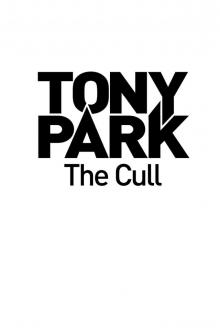 The Cull
The Cull Blood Trail
Blood Trail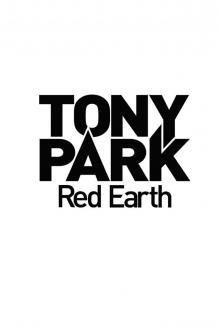 Red Earth
Red Earth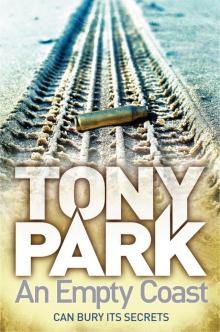 An Empty Coast
An Empty Coast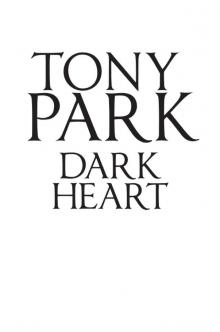 Dark Heart
Dark Heart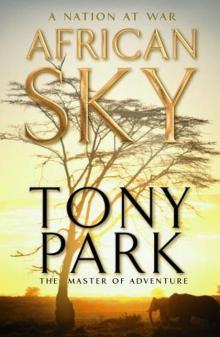 African Sky
African Sky The Delta
The Delta Captive
Captive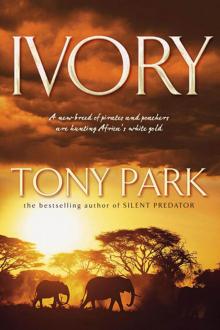 Ivory
Ivory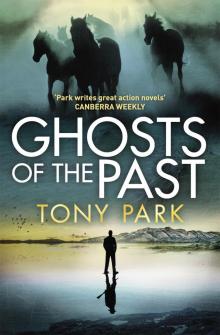 Ghosts of the Past
Ghosts of the Past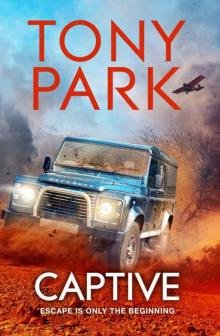 Captive_A High-octane And Gripping African Thriller
Captive_A High-octane And Gripping African Thriller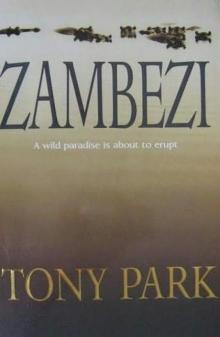 Zambezi
Zambezi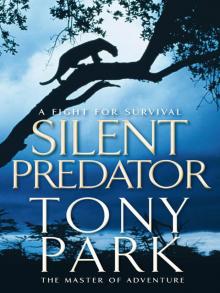 Silent Predator
Silent Predator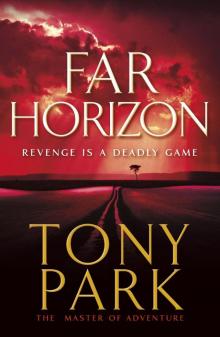 Far Horizon
Far Horizon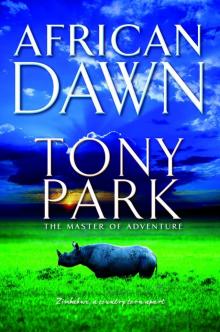 African Dawn
African Dawn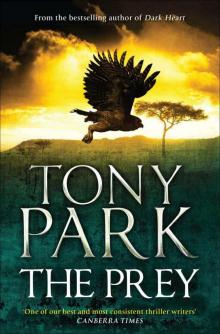 The Prey
The Prey Safari
Safari